As your parents age, you may find yourself increasingly concerned about their well-being and ability to live independently. At More Time Healthcare, we specialise in providing personalised domiciliary care, tailored to meet the unique needs of your loved ones. Whether it’s assistance with daily tasks or comprehensive care, we are here to help.
Recognising the signs that your elderly parents might need extra care at home is crucial for ensuring their safety, health, and quality of life. While it can be challenging to broach this sensitive topic, being proactive about your parent’s care needs can prevent accidents, improve their overall health, and provide you with peace of mind. In this article, we’ll explore key indicators that suggest it might be time to consider additional support, such as professional domiciliary care, for your ageing loved one.

Noticing Changes in Daily Activities
Decline in Personal Care
As your parents age, you may notice a gradual decline in their personal hygiene and grooming habits. Look for signs such as unkempt hair, unwashed clothes, or a noticeable body odour. These changes could indicate difficulty with self-care tasks or a loss of interest in maintaining their appearance. If you observe these shifts, it might be time to consider additional support to ensure your loved one’s well-being and dignity.
Struggling with Household Chores
Pay attention to the state of your parent’s living environment. A once-tidy home becoming cluttered or dirty can be a red flag. You might notice piles of unwashed dishes, overflowing trash bins, or neglected houseplants. These signs often suggest that your elderly parent is finding it challenging to keep up with routine household maintenance. Offering assistance or exploring professional domiciliary care options can help maintain a safe and comfortable living space.
Changes in Eating Habits
Observe your parent’s eating patterns and nutritional intake. Weight loss, a refrigerator filled with spoiled food, or a sudden preference for easy-to-prepare meals might indicate difficulties with grocery shopping, cooking, or meal planning. Proper nutrition is crucial for seniors’ health, and these changes could signal a need for support in meal preparation and ensuring a balanced diet.
Increased Memory Loss or Confusion
Forgetfulness Beyond Normal Aging
As your parents age, some degree of forgetfulness is normal. However, if you notice a significant increase in memory lapses or confusion, it may be a sign that additional care is needed. Watch for instances where your loved one frequently misplaces important items, forgets to pay bills, or struggles to remember recent conversations. These could indicate cognitive decline that requires professional attention.
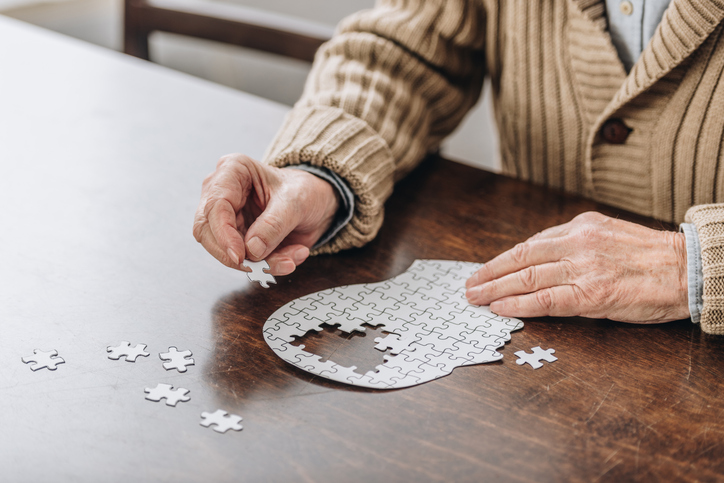
Difficulty with Daily Tasks
Pay attention to your parent’s ability to manage routine activities. If they’re having trouble preparing meals, maintaining personal hygiene, or keeping up with household chores, it might be time to consider extra support. Look for signs like unopened mail piling up, spoiled food in the refrigerator, or a noticeable decline in personal appearance.
Disorientation and Wandering
Increased confusion can sometimes lead to disorientation, even in familiar surroundings. If your parents get lost in their own neighbourhood or have difficulty navigating their home, it’s a clear indicator that they need additional assistance. Wandering behaviours, particularly at night, can be dangerous and may necessitate round-the-clock care to ensure their safety and well-being.
Remember, early intervention is key. If you notice these signs, consulting with a healthcare professional or a domiciliary care service like More Time Healthcare can help you determine the best course of action for your loved one’s unique needs.
Issues with Medication Management
As your elderly parent ages, managing medications can become increasingly challenging. Recognising signs of difficulty in this area is crucial for ensuring their health and safety.
Missed Doses and Confusion
You might notice your parents frequently forgetting to take their medications or becoming confused about which pills to take when. This could manifest as:
- Unopened pill bottles
- Medication taken at incorrect times
- Mixing up different prescriptions
These issues can lead to serious health complications and indicate a need for additional support.
Improper Storage and Expired Medications
Another red flag is the improper storage of medications. Check if your parent is:
- Keeping medications in areas exposed to heat or moisture
- Failing to refrigerate medications that require it
- Holding onto expired prescriptions
Proper medication management is vital for your parent’s well-being, and struggles in this area may signal it’s time to consider professional domiciliary care.
Adverse Reactions and Side Effects
If you observe unexplained changes in your parent’s health or behaviour, it could be due to medication issues. Watch for:
- Sudden dizziness or fatigue
- Unusual mood swings
- Unexpected physical symptoms
These signs might indicate adverse drug interactions or improper dosing, highlighting the need for expert oversight in medication management.
Declining Mobility and Increased Safety Risks
As your parents age, you may notice changes in their physical abilities that signal a need for additional support. Recognising these signs early can help ensure your loved one’s safety and well-being.
Difficulty with Daily Activities
Watch for struggles with routine tasks like getting dressed, preparing meals, or maintaining personal hygiene. If your parents are having trouble with these activities, it may be time to consider extra assistance.
Increased Risk of Falls
Pay attention to your parent’s balance and coordination. Frequent stumbling, holding onto furniture while walking, or unexplained bruises could indicate a higher fall risk. Installing grab bars or providing a walking aid might be necessary to prevent accidents.

Mobility Limitations
Notice if your parent is having trouble navigating stairs, getting in and out of chairs, or moving between rooms. These challenges can significantly impact their quality of life and independence.
Home Safety Concerns
Assess your parent’s living environment for potential hazards. Clutter, loose rugs, or poor lighting can increase the risk of accidents. Consider making home modifications or enlisting professional help to create a safer living space.
By staying attentive to these signs, you can proactively address your parent’s changing needs and ensure they receive the appropriate level of care to maintain their safety and independence at home.
Assess your parent’s living environment for potential hazards. Clutter, loose rugs, or poor lighting can increase the risk of accidents. Consider making home modifications or enlisting professional help to create a safer living space.
By staying attentive to these signs, you can proactively address your parent’s changing needs and ensure they receive the appropriate level of care to maintain their safety and independence at home.
Social Isolation and Mood Changes
Recognising Withdrawal
As your parents age, you may notice a gradual shift in their social habits. Perhaps they’re declining invitations more frequently or spending less time with friends and family. This withdrawal could be a sign that they’re struggling with mobility issues or feeling overwhelmed by social interactions. Keep an eye out for changes in their usual routines or a reluctance to engage in activities they once enjoyed.
Emotional Red Flags
Mood swings, irritability, or persistent sadness in your elderly parent shouldn’t be dismissed as mere “grumpiness.” These emotional changes could indicate underlying health issues, cognitive decline, or a need for additional support. Pay attention to:
- Increased anxiety or agitation
- Unexplained bouts of anger or frustration
- Loss of interest in hobbies or pastimes
- Expressions of loneliness or feeling burdensome
If you notice these signs, it may be time to consider professional domiciliary care to provide companionship and emotional support.
The Impact of Isolation
Social isolation can have serious consequences for your parent’s overall well-being. Research shows that loneliness in older adults is linked to higher risks of cognitive decline, depression, and even physical health problems. By addressing these issues early and seeking appropriate care, you can help your parent maintain their quality of life and emotional health as they age.
Conclusion
As you navigate the challenges of caring for an ageing parent, stay vigilant for these signs that additional support may be necessary. Remember, seeking help is not a sign of failure, but rather an act of love and responsibility. By recognising these indicators early, you can ensure your parents receive the care they need to maintain their quality of life and independence. For compassionate, one-on-one domiciliary care, trust More Time Healthcare.






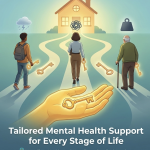
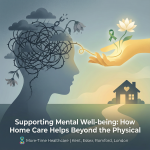
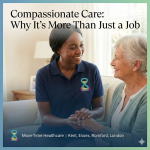
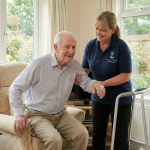

Leave a Reply